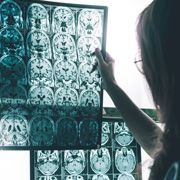Experimental Drug Effective in Treating Symptoms of Autism and Alzheimer’s Disease
Has FDA orphan designation for a rare developmental disorder
An extensive TAU-led international study found that an experimental drug, which has already been awarded orphan drug designation by the FDA for future treatment of a rare development disorder, may also be used for treating a variety of symptoms relating to autism, intellectual disability, and Alzheimer’s disease.
The drug, NAP, was discovered in the lab of Prof. Illana Gozes of the Tel Aviv University Sackler Faculty of Medicine’s Department of Human Molecular Genetics and Biochemistry. The latest study is an important milestone on the way to developing a drug, or drugs, that will help children with autism stemming from genetic mutations, as well as Alzheimer's patients.
Groundbreaking Technology
In recent years, the FDA has granted the experimental drug with orphan drug designation and pediatric rare disease designation for treatment of a rare developmental disorder called ADNP syndrome, which can cause a variety of symptoms, among them intellectual disability and autism spectrum disorder.
In the current study, a team of researchers led by Prof. Gozes (also from Sagol School of Neuroscience) developed an innovative lab model and found that NAP can be effective in treating a broad spectrum of symptoms of ADNP syndrome, which is caused by mutations in the ADNP gene (essential to cerebral development and protecting cerebral brain cells). Previous studies showed that ADNP syndrome is related to Alzheimer’s disease and certain types of mental disabilities, developmental delays, and autism.
The study, which is the culmination of the MD/PhD student Dr. Gideon Carmon’s doctoral research, was joined by a team of researchers from Prof. Gozes’s lab: Dr. Shlomo Sergovich, Gal Hacohen-Kleiman, Inbar Ben-Horin-Hazak, Dr. Oxana Kapitansky, Alexandra Lubincheva, and Dr. Eliezer Giladi. The team was further joined by Dr. Moran Rubinstein, Prof. Noam Shomron, and Guy Shapira of TAU’s Sackler Faculty of Medicine, and Dr. Metsada Pasmanik Chor of Tel Aviv University’s The George S. Wise Faculty of Life Sciences. Researchers from the Czech Republic, Greece, Germany, and Canada also participated. The article was published in the prestigious journal Biological Psychiatry.
Important Milestone
Prof. Gozes explained that: “NAP, in fact, comprises a short segment of the normal ADNP protein. We previously found that treatment using NAP corrects the function of human nerve cells afflicted with ADNP syndrome in a laboratory test-tube. In this study, we sought to examine the efficacy of NAP in treating various aspects of the syndrome using a model with the most harmful mutation, which allowed us to view brain development and facilitate remedying of behavioral problems.”
The researchers found that mice suffering from ADNP syndrome demonstrated a broad spectrum of symptoms, including increased rates of neonatal death immediately after birth, slowed development and abnormal stride, primarily among females, as well as poor voice communication.
Cerebral examinations demonstrated additional findings: A relatively small number of synapses (the points of contact between nerve cells), impaired electrophysiological activity demonstrating a low potential for normal cerebral arousal, as well as excessive buildup of the Tau protein in young mice, similar to those in the brains of elderly Alzheimer's disease patients.
Prof. Gozes: "In the past, we have found that NAP corrects impaired functioning of ADNP that has mutated in the nerve cell model in the culture. We now examined its effect in vivo – in animals modeling the syndrome (ADNP mutation). To our amazement and joy, we discovered that treatment using NAP normalizes the functioning of these mice for most of the symptoms indicated above!"
Prof. Gozes summarized: "In this study, we examined the effect of the ADNP gene’s most prevalent mutation in a broad spectrum of aspects and found extensive impairment in physical and cerebral functioning parallel to the symptoms of autism, developmental delay, mental disability, and Alzheimer's disease in humans. Similarly, we examined the potential use of the NAP drug for treating these diseases, and discovered that it is effective against most of these symptoms in lab models. This study is an important milestone on the way to developing a drug, or drugs, that will help children with autism stemming from genetic mutations, as well as Alzheimer's patients."
Ramot - Tel Aviv University Tech Transfer Company filed a number of patent applications to protect the technology and its implementation and, in collaboration with Prof. Gozes, is raising funds to finance further clinical research. Similarly, Ramot is in discussions regarding commercial collaboration with pharmaceutical companies. "We’re excited by this new discovery and believe that this is groundbreaking technology that will remedy a variety of symptoms and disabilities in a broad spectrum of orphan diseases," said Prof. Keren Primor Cohen, CEO of Ramot.






